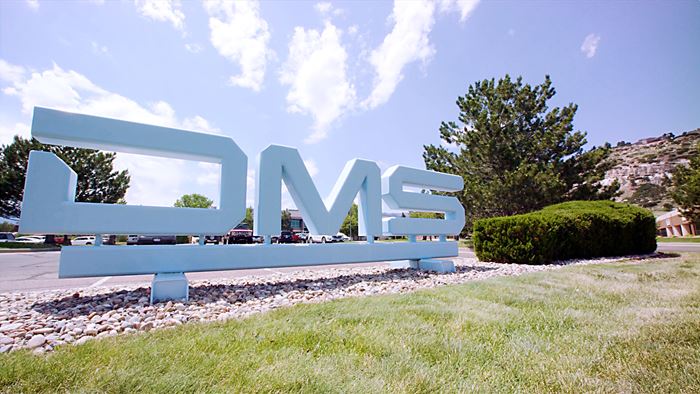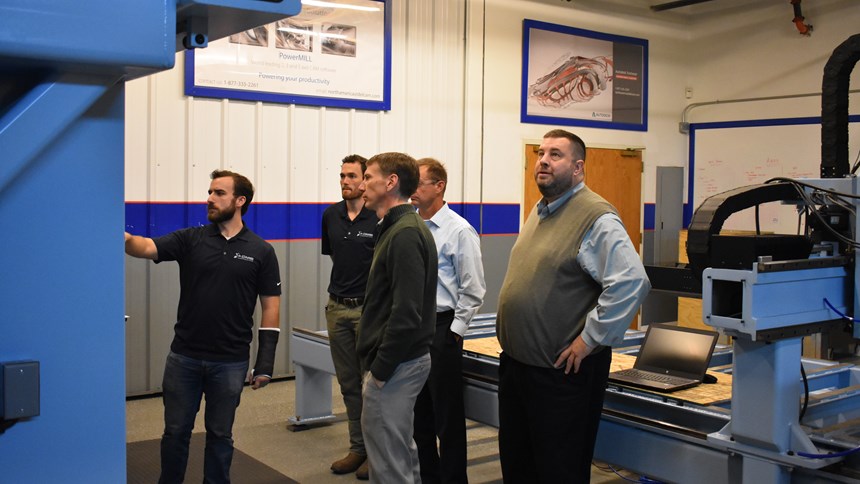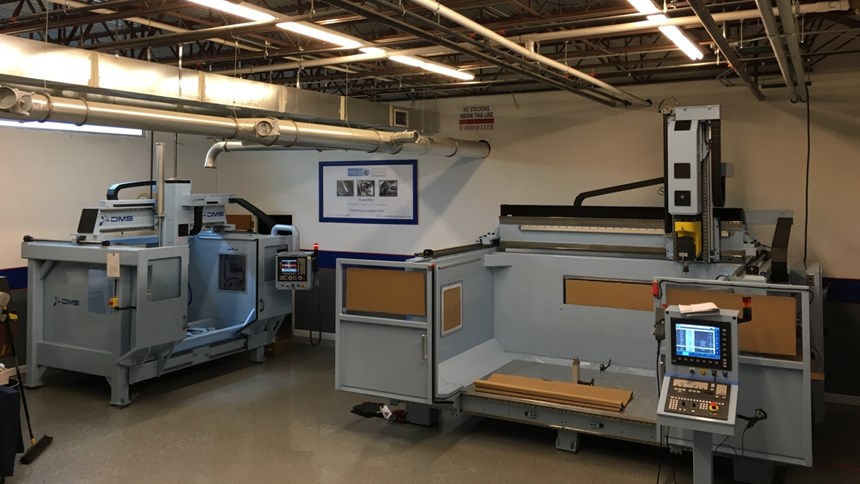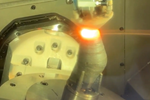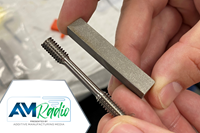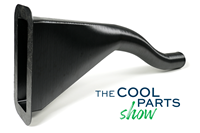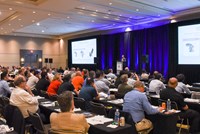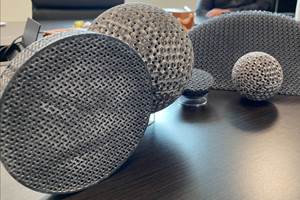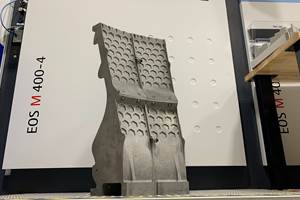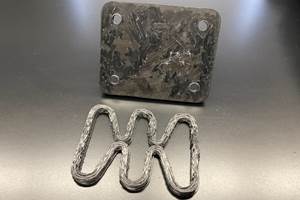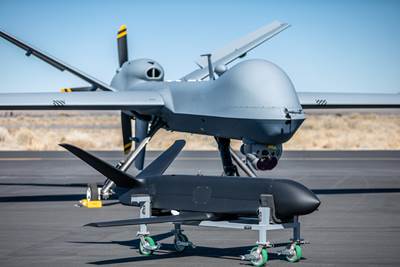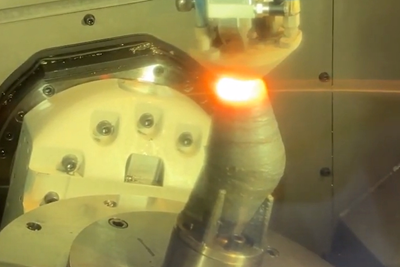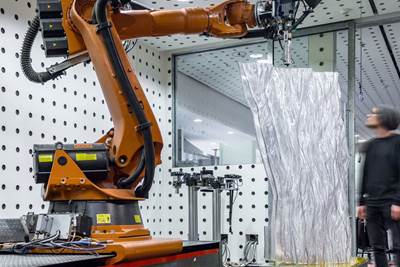DMS Introduces Hybrid Machines, Doubles its Advanced Manufacturing Center
In quick succession, Diversified Machine Systems opened its Advanced Manufacturing Center and began to offer hybrid additive-subtractive machines. After just two years, the company plans to double the center’s size.
There is a popular marketing philosophy that prescribes showing potential customers not what a product can do, but rather what they can do with it. Put another way, don’t try to sell technology and features—sell benefits. Sell ROI. Sell customers better versions of themselves. Steve Jobs famously marketed the first iPod not by hyping its storage capacity or design, but by inspiring people to dream about carrying a thousand songs in their pocket.
This line of thought seems to be at the heart of a trend taking place among OEMs of additive manufacturing and hybrid machines. When a company makes the substantial investment for one of these machines, it’s really doing so not for the sake of the technology, but so the company can produce better products and attract new customers. Yet for today’s AM equipment OEMs, new technologies and applications provide a new dilemma: how to convince a customer to invest in additive when the variables are so vast and changing.
At least one solution is gaining traction: Provide customers an experiential environment that serves as equal parts showroom, classroom and laboratory—a place where they can not only run test parts, but learn about a technology that may be new to them. GE Additive offers two such facilities (in Pittsburgh and Munich) called the Customer Experience Center, while Matsuura Machinery just opened its Lumex Advanced Manufacturing Center. And now, just three years after Diversified Machine Systems (DMS) opened its first Advanced Manufacturing Center (AMC), the Colorado Springs, Colorado-based company is already planning to double the center’s size in a new facility that it plans to open by 2019.
I recently spoke with Ed Hilligrass, DMS’s executive vice president and chief sales officer (CSO), who acknowledged that the original concept of the AMC wasn’t exactly revolutionary. Traditional machine tool builders have operated tech centers for years. Typically, these are places where customers can test-run a machine to ensure it can cut their parts to spec effectively. But Hilligrass says that the AMC resulted from DMS’s deep-dive analysis of domestic manufacturing changes—changes such as reshoring, the growing diversity of machine styles and OEM startups, the merging of technologies and the increasing production capacity of additive machines. As a result, in quick succession, DMS opened its center and debuted its first metal and polymer hybrid machines, Hilligrass says, lest the company end up being commoditized as a CNC manufacturer.
“We desperately wanted to avoid that,” he says.
“We started adapting our business to an advanced manufacturing model,” he adds, “taking into consideration a lot of key disrupters we were seeing, such as knowledge gaps in new technologies, automation, integration of software to different pieces of hardware and so forth. Within a three-year period of implementing the AMC, we actually doubled our revenue and doubled the size of the company.”
DMS, which has been known primarily as a custom manufacturer of large three- and five-axis CNC machining centers, now offers hybrid machines using metal and composite deposition that combines additive manufacturing with both three- and five-axis machining solutions. Hilligrass says that DMS has hired a number of engineers in the past few years to expand the company’s offerings in the hybrid space. “Some of these guys that we've brought on from national labs came to us with strong technology and process knowledge,” he says. “So it’s as if we're kind of giving them a playground to help develop other technologies—almost like an extension of where they worked in a national lab. Only now they're here with an OEM, and they're saying, ‘What if we make the machine like this? Can we add this capability?’ And the answer is yes, that’s what we do.”
Hilligrass describes DMS’s center as a mechanism to not only expose its global customer base to new technologies and capabilities, but also help them understand the engineering processes that go into its machine designs. Customer also learn which type of components can be applied toward different industry verticals, materials and processes. With hybrid technologies specifically, Hilligrass says that customers are seeking guidance that goes beyond the question of which machine they should choose. “The whole idea of the AMC concept was not to just be a showroom for customers to come pick something out, but also to educate them about these products: how they do what they do, why they do it, why it's developed and designed a certain way, and what technologies meet certain needs. So not only did they not necessarily know how to buy a product, they were always waiting for someone to recommend something to them. What we're doing is pulling back the curtain, so to speak, and saying, ‘Here's how you pick a machine. Here’s why you pick a machine.’ We want to help them identify what they need, then help them think beyond that.”
Related Content
Better, More Compact Radio Frequency Devices Through 3D Printing
3D printing technology company Fortify is applying its photopolymer process and material developed with Rogers Corporation to serve the expanding RF market.
Read More3D Printed Spares, Electrification and Cool Parts: Top 10 Stories of 2022: AM Radio #31
Our top articles and videos from 2022 reflect increasing use of additive manufacturing for replacement parts; growing applications for electric motors; and a maturing user base. Read through the top 10 list or listen to the AM Radio podcast episode all about these stories.
Read MoreLouisville Slugger Uses Formlabs Technology to Accelerate Innovation
Louisville Slugger relies on Formlabs’ Form 3 stereolithography 3D printer to create both prototypes and manufacturing aids for designs of the composite and aluminum bats swung by youth and collegiate players.
Read MoreTo Improve Performance of Compression Molded Composites, Add 3D Printed Preforms
9T Labs' Additive Fusion Technology enables the manufacture of composite structures with as much or as little reinforcement as is necessary, using 3D printed continuous fiber preforms to add strength just where needed.
Read MoreRead Next
At General Atomics, Do Unmanned Aerial Systems Reveal the Future of Aircraft Manufacturing?
The maker of the Predator and SkyGuardian remote aircraft can implement additive manufacturing more rapidly and widely than the makers of other types of planes. The role of 3D printing in current and future UAS components hints at how far AM can go to save cost and time in aircraft production and design.
Read MoreHybrid Additive Manufacturing Machine Tools Continue to Make Gains (Includes Video)
The hybrid machine tool is an idea that continues to advance. Two important developments of recent years expand the possibilities for this platform.
Read More3D Printing Brings Sustainability, Accessibility to Glass Manufacturing
Australian startup Maple Glass Printing has developed a process for extruding glass into artwork, lab implements and architectural elements. Along the way, the company has also found more efficient ways of recycling this material.
Read More

